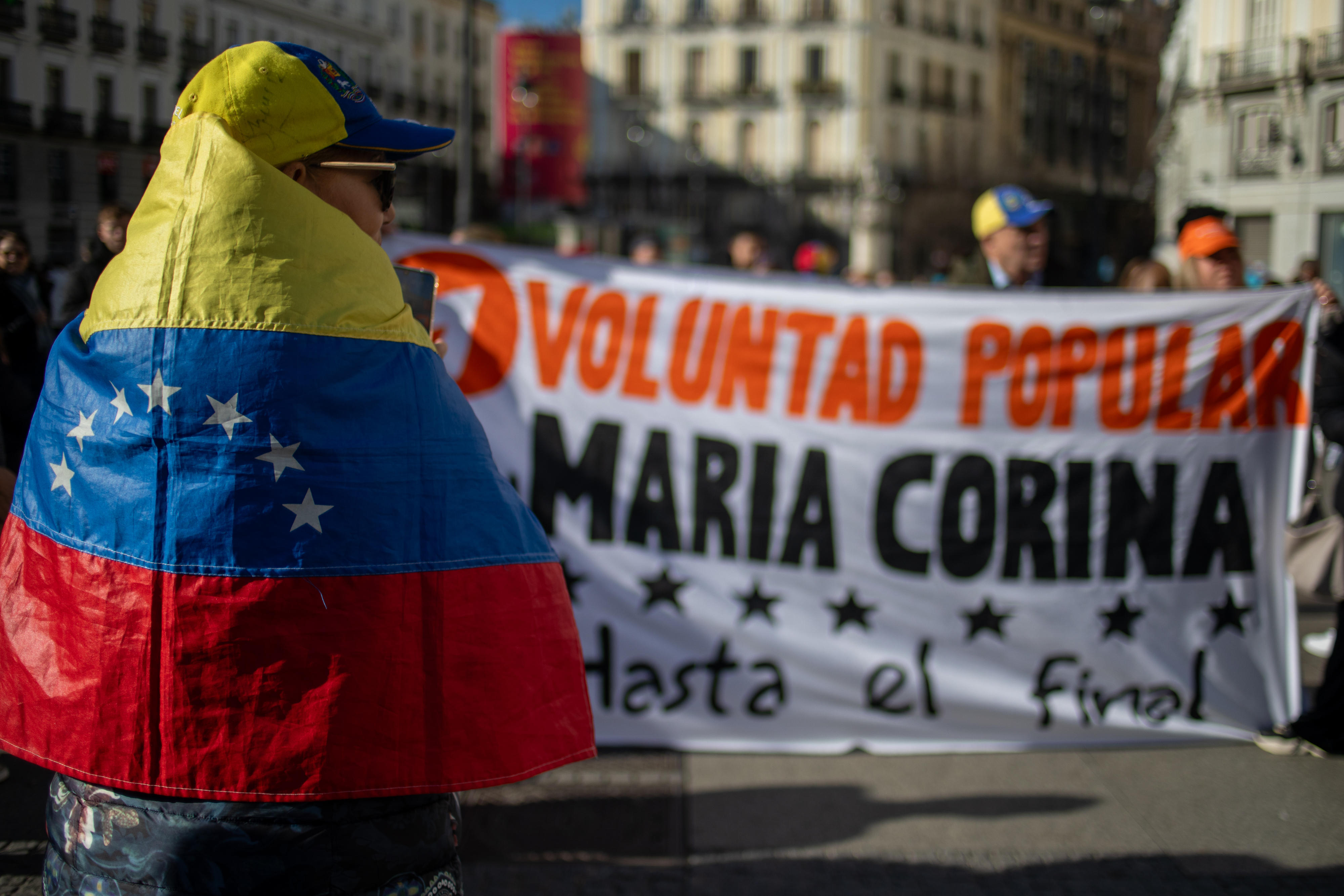Venezuela
Machado: The only path for democratic redemption in Venezuela

Supporters of the opposition to the Venezuelan government of Nicolas Maduro have gathered this Sunday at an international meeting in support of the presidential candidate María Corina Machado under the slogan, "Venezuela does not surrender"
© picture alliance / Sipa USA | SOPA ImagesThe recent decision of Venezuela's Supreme Justice Tribunal to uphold the “arbitrary and politically fabricated disqualification”[1] imposed last year against opposition leader Maria Corina Machado has surprised only a few. This ban legally prevents her from running in the upcoming presidential election, which date is still to be announced by the Maduro-regime.
Sadly, considering the lack of effective separation of powers in the Maduro regime and its track record of wrongfully sanctioning political rivals[2], this outcome was foreseeable as early as last October. During the opposition primary elections, Machado achieved a landslide victory, securing over 92% of the votes and earning her the position as the sole opposition candidate. This pivotal event not only demonstrated Machado's widespread support but also showcased the strength of the Venezuelan people, with more than two million votes cast.
The regime had agreed on an independent and transparent electoral process in a deal signed last October in Barbados. The arrangement also stipulated the presence of international electoral observers. However, as Jordi Cañas of RENEW EUROPE pointed out, the European Union will dispatch election observers only if the opposition's elected candidate is permitted to participate[3].
A Critical Opportunity
As blunt as it may sound, the reality is that Machado's participation in this race could represent the Venezuelans' sole opportunity in the near future to peacefully remove Maduro and guide the country back onto a democratic path. In the South American country, presidential terms last for six years. Maduro's far-left socialist party currently controls not only the National Assembly (the country’s unicameral Congress) but also the courts and the electoral body. Consequently, if Maduro’s party retains power in this election—whether he is the candidate is still uncertain—the next chance for Venezuelans to vote against him would theoretically be in 2030.
As I emphasised last year prior to the primaries[4], Machado embodies an unwavering commitment to democratic principles in the face of daunting challenges and even threats to her own integrity. The millions who voted to elect her in the primaries, both within Venezuela and abroad, confirmed this. As is known, more than 7 million Venezuelans had to leave their home country due to the humanitarian crisis caused by the regime. Therefore, it is crucial that the electoral register is adequately updated to ensure the participation of Venezuelans living abroad in the 2024 elections.
Challenges Ahead
A report published last year by the United Nations Human Rights Council’s independent International Fact-Finding Mission on Venezuela, covering the period from January 2020 to August 2023, concluded that “serious human rights violations, including arbitrary detention, torture, and sexual violence” were still being committed in the country[5]. It also stated that these actions were “part of the same course of conduct previously qualified by the mission as crimes against humanity”.
Similarly, Human Rights Watch's 2023 country report on Venezuela emphasises the continued prevalence of common practices such as “the harassment, persecution, and imprisonment of union workers, journalists, and human rights defenders, thereby restricting civic space”[6]. More specifically, the international organisation expresses recurrent concerns “about the lack of protection for Indigenous people, as well as lesbian, gay, bisexual, and transgender (LGBT) individuals, and the rights of women and girls.”
Machado is not the only opposition candidate banned from participating in Venezuelan politics without any legitimate basis. The same court that upheld Machado’s disqualification also confirmed the ban against Henrique Capriles, who participated twice as the opposition candidate in 2012 (against Hugo Chavez) and 2013 (against Nicolas Maduro). Furthermore, the opposition not only faces political bans but several reports point to heavy harassment and arrest orders of members of Machado’s team.
The International Response
If the international community's support for Venezuelan opposition leaders and its coordinated efforts to exert pressure on Maduro’s regime were crucial before, now it may be the only hope Venezuelans have to enable Machado’s participation. In previous years, even massive public protests have been suppressed with brutal violence and arbitrary incarcerations.
The European Union and numerous countries have condemned the decision of Venezuela’s Supreme Tribunal, calling for the full implementation of the Barbados agreement.[7] Even Chile’s left-wing government has directly criticised the arbitrary disqualification of Machado. The United States has recently announced the eventual reintroduction of sanctions citing the decision as a response to “absent progress between Maduro and his representatives and the opposition Unitary Platform, particularly regarding allowing all presidential candidates to compete in this year’s election.”[8]
All these actions are essential, but more vigorous calls for genuinely democratic elections in Venezuela are needed to maintain momentum. The longer it takes for Venezuela to regain democracy, the more challenging it will be to rebuild its crumbling institutions and restore the well-being of its people. In conclusion, as the world watches Venezuela's political landscape unfold, a united and sustained effort is imperative to ensure genuine democratic elections, providing the Venezuelan people with the opportunity to shape their nation's future.
[1] https://www.europarl.europa.eu/doceo/document/TA-9-2023-0288_EN.html
[2] https://www.hrw.org/world-report/2023/country-chapters/venezuela
[3] https://www.eeas.europa.eu/eeas/venezuela-municipal-and-regional-elections-and-eu-electoral-observation-mission_en
[4] https://www.freiheit.org/de/zentralamerika/venezuelas-point-no-return
[5] https://www.ohchr.org/sites/default/files/documents/hrbodies/hrcouncil/sessions-regular/session54/advance-versions/A_HRC_54_57_AdvancedUneditedVersion.pdf
[6] https://www.hrw.org/world-report/2024/country-chapters/venezuela
[7] https://www.eeas.europa.eu/eeas/venezuela-statement-spokesperson-banning-opposition-politicians_en
[8] https://www.state.gov/venezuela-sanctions-actions-and-supporting-democracy/
